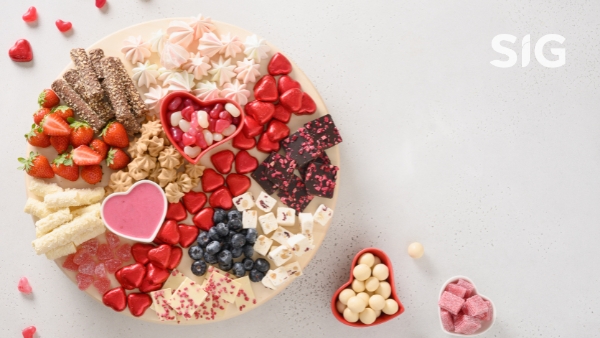Valentine’s Day is a time for love and appreciation, often marked by exchanging gifts like chocolates, sweets, and delicious meals. However, ensuring the food we consume is free from harmful substances is essential for protecting the health of our loved ones. By making informed choices, you can celebrate this special day with safe, high-quality treats.
Why Food Safety Matters on Valentine’s Day
Many Valentine’s treats contain artificial additives that may pose health risks when consumed in excess. To help you choose wisely, here are some common food additives to watch out for and how to ensure the safety of your food.

1. Beware of Artificial Sweeteners
Many food and beverage products contain artificial sweeteners such as aspartame, saccharin, and cyclamate. While these are approved by BPOM (Indonesian Food and Drug Authority) under Regulation No. 11 of 2019 on Food Additives, excessive consumption can lead to health issues, especially for individuals with diabetes. Opting for natural sweeteners and moderating intake is a smarter choice.
SIG offers food testing services for various sweeteners, including:
- Total Sugar Content
- Fructose
- Glucose
- Sucrose
- Maltose
- Lactose
- Saccharose
- Xylose
- Dextrose
- Stevia
- Neotame
- Acesulfame K
- Cyclamate
- Saccharin
- Sucralose
- Aspartame
- Maltitol
- Mannitol
- Xylitol
- Sorbitol
2. Avoid Harmful Preservatives in Food
Food preservatives extend shelf life, but some, like borax and formalin, are illegal and pose serious health risks. Even permitted preservatives should be used within the recommended limits.
SIG provides testing for food preservatives such as:
- Sorbic acid (E200)
- Potassium sorbate (E202)
- Sodium benzoate (E211)
- Sodium nitrate (E251)
- Sodium nitrite (E250)
- Sulfur dioxide (E220)
- Sodium metabisulfite (E223)
- Calcium propionate (E282)
- BHA (Butylated Hydroxyanisole, E320)
- BHT (Butylated Hydroxytoluene, E321)
- Paraben profile (Nipagin, Nipasol)
3. Watch Out for Synthetic Food Colorants
Synthetic colorants, such as Tartrazine and Erythrosine, can cause allergic reactions and other health concerns, especially in children. Natural alternatives like turmeric, beetroot, and spirulina are safer options.
SIG offers colorant testing services, detecting harmful dyes such as:
- Rhodamine B
- Metanil Yellow
- Sudan (Sudan I-IV)
- Tartrazine (E102)
- Sunset Yellow (E110)
- Ponceau 4R (E124)
- Allura Red (E129)
- Erythrosine
Ensure Food Safety with SIG Laboratory Testing
SIG is committed to ensuring food quality and safety through accurate laboratory testing. Our services include:
- Chemical contamination analysis
- Pesticide residue testing for fresh produce
- Heavy metal testing to detect toxic substances
- Microbiological analysis to check for harmful bacteria
- Food additive testing to detect unsafe levels of preservatives, colorants, and sweeteners
- Nutritional fact labeling to verify food content accuracy
Tips for Choosing Safe and High-Quality Food
To enjoy a healthy and worry-free Valentine’s Day, follow these tips:
- Check Packaging Labels – Ensure the product lists all ingredients and has BPOM approval.
- Choose Natural and Fresh Foods – Opt for fresh ingredients instead of highly processed snacks.
- Avoid Unverified Products – Steer clear of food items without proper certification or halal labeling.
- Use Healthy Cooking Methods – Prefer baking or steaming over frying to reduce unhealthy fats.
Conclusion
Valentine’s Day should be celebrated with love and care, not just in gestures but also in the quality of food we share. By choosing safe, high-quality products, you can protect your loved ones from harmful substances. Make this special day even more meaningful by prioritizing health and safety.
SIG is here to help with reliable food testing services. For more information, contact us at 082111516516, visit our website siglaboratory.com, or stop by Graha SIG, Jl Rasamala No. 20, Taman Yasmin, Bogor, Jawa Barat 16113.
Celebrate with confidence—choose safe and high-quality food this Valentine’s Day!


